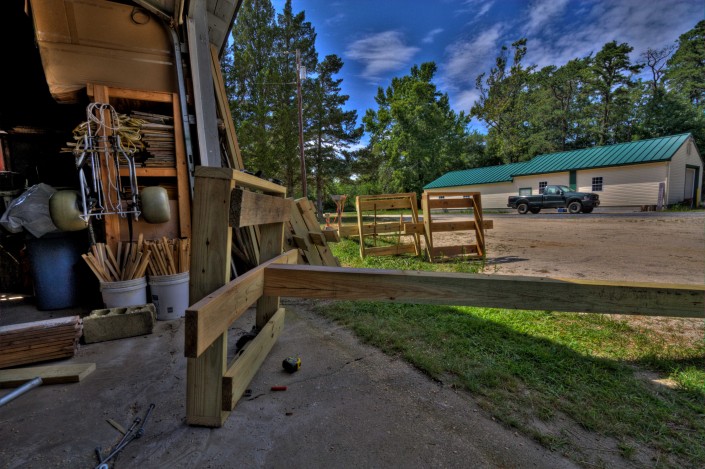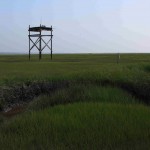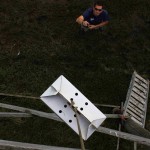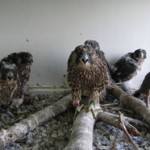CWF Honors Four Inspiring Leaders at 12th Annual Women & Wildlife Awards
Former Gov. Kean delivers stirring keynote speech before 200 people at Duke Farms event
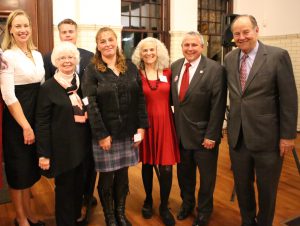
Hillsborough, NJ – The nonprofit Conserve Wildlife Foundation of New Jersey (CWF) celebrated their 12th annual Women & Wildlife Awards on November 1 before over 200 people at Duke Farms in Hillsborough, New Jersey.
The 2017 honorees include Hazel England of the Great Swamp Watershed Association, Jeannie Geremia of the Garden Club of New Jersey, Kelly Mooij of New Jersey Audubon, and Kris Schantz of the New Jersey Endangered and Nongame Species Program.
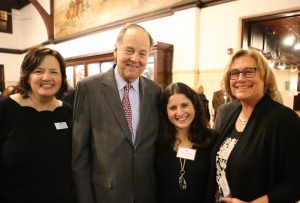
“Tonight we are recognizing four great women who have accomplished wonderful things and who have worked in their own way to make this world and this state a better place,” said former New Jersey Governor Tom Kean in his keynote speech. “They have worked to do what is necessary to make sure that when we pass this planet down to our children and our grandchildren, it is not worse than what we received. These four women show us what great things an individual can do for all of us.”
Since 2006, CWF’s Women & Wildlife Awards have recognized special individuals for their achievements on behalf of New Jersey’s wildlife and the advances they have made in professions in which women have long been underrepresented.
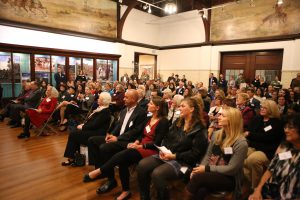
“All too often, young girls are turned away from promising careers in the STEM fields – Science, Technology, Engineering, and Mathematics,” said David Wheeler, CWF Executive Director. “Yet here in New Jersey, wildlife conservation efforts benefit from a strong and inspiring core of female scientists, educators, advocates, researchers, and rehabilitators who serve as role models for the next generation. Thanks to our Women & Wildlife honorees, today’s young girls can feel confident in pursuing science and conservation as careers with limitless and exciting possibilities.”
Hazel England, Great Swamp Watershed Association Director of Outreach and Education, was honored for bringing environmental education programs about our local ecosystems and habitats to students and teachers of all ages.
“I am honored to have received the Educator Women & Wildlife Award from Conserve Wildlife Foundation. It was truly humbling to be in the company of such inspirational women who are working in the field of conservation,” said England. “I’m thrilled that my two daughters got to experience this event with me; learning about the great work these other remarkable women are doing, and gaining some very direct political insight from Governor Tom Kean. It was a real privilege to hear him speak and a highlight of the night for me.”
Jeannie Geremia, Great Swamp Watershed Association Director of Outreach and Education, was honored for bringing environmental education programs about our local ecosystems and habitats to students and teachers of all ages.

“Receiving the Conserve Wildlife Foundation’s Women in Wildlife 2017 Award for Service is one of the highlights of my life and I am humbled by the august company of outstanding women who were similarly honored,” said Geremia. “Nature is our passion and working to ensure that our imperiled wildlife species, including our pollinators, survive and thrive is the common goal. Joining dedicated individuals and organizations in a united effort of educating and inspiring people to action will accomplish these mutual goals of a healthy environment for all living creatures. Governor Kean said it all so eloquently as he invoked the spirits of Rachel Carson and Helen Fenske in his heartfelt keynote speech, setting the tone for this memorable event.”
State Senator Kip Bateman presented Jeannie Geremia with her award.
“Jeannie, you really have dedicated your life to making a difference, and it’s so important what you’ve done,” said Senator Bateman. “It’s a real pleasure to be here to honor four outstanding women who have truly made a difference in New Jersey. Each of you is so deserving of this award.”
Kelly Mooij, New Jersey Audubon Vice President of Government Relations, was honored for her strong leadership on a number of successful watershed protection, open space preservation, and wildlife funding campaigns.
“I’m honored to have received this recognition from the Conserve Wildlife Foundation, a wonderful partner in protecting our amazing wildlife throughout the State,” said Mooij. “Educating decision-makers and supporting science-based policy is one of the most effective and efficient ways to protect wildlife and preserve habitat and I’ve been so fortunate in my career to be able to work with amazing non-profit colleagues and to use the powerful tool of advocacy to make NJ a better place for people and wildlife.”
Kris Schantz, principal zoologist with the New Jersey Department of Environmental Protection’s Endangered and Nongame Species Program, was honored for her work protecting the endangered timber rattlesnake and other at-risk reptiles.
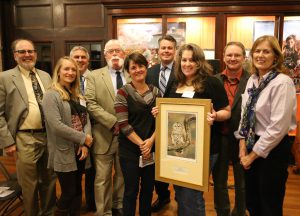
“I am truly honored to have received this award from the Conserve Wildlife Foundation, as there are so many deserving women doing invaluable conservation work within New Jersey,” said Schantz. “We must all – women, men, children – continue to strive to make NJ a better place for our citizens and future generations through the protection and nurturing of our natural resources.”
Event sponsors included PSE&G, Eric Sambol, The Danberry and DeLucia Family, Dr. Barbara Brummer, Dewberry, James Fiorentino, Amy S. Greene Environmental Consultants, Inc., Lackland Associates, Inc., Merrill G. & Emita E. Hastings Foundation, Dr. Kumar Patel.
Patrons included Bountiful Gardens, Bob and Maureen Coleman, Glenn Insurance, Inc., Elwood and Ruth Kerkeslager, Mercer County Wildlife Center, New Jersey Audubon, Renzi Bernardi Suarez & Co., Rick Weiman, Your Part-Time Controlled, and Zoological Society of New Jersey.
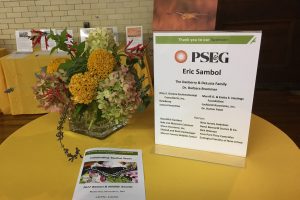
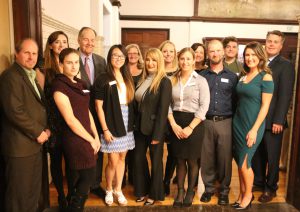
For more information on the 2017 Women & Wildlife Awards, please visit www.ConserveWildlifeNJ.org/getinvolved/event/women/.
To learn more about CWF, please visit www.ConserveWildlifeNJ.org.
The short biographies for the honorees follow:
HAZEL ENGLAND: EDUCATION
Hazel England has spent 24 years as an enthusiastic environmental educator and naturalist in New Jersey, bringing education programs about our local ecosystems and habitats to students and teachers of all ages. Since 2004, Ms. England has led educational and stewardship programs at the Great Swamp Watershed Association as the Director of Outreach and Education. She is a state-certified facilitator for many nationally acclaimed environmental education curriculums, including Project WILD, WET, WOW, PLT HWHP, and Bridges to the Natural World.
Ms. England has a Bachelor of Science in Zoology and Botany from the University of Dundee, as well as a Master’s degree in Ecology and Environmental Management from the University of Aberdeen in Scotland. She sets an excellent model for other women to follow by being an accomplished natural scientist who brings her passion to life for people of all ages.
JEANNIE GEREMIA: SERVICE
For the past decade as the Vice President for the Garden Club of New Jersey, Jeannie Geremia has followed her passion for protecting pollinators by leading, inspiring, and educating others on the importance of pollination and wildlife habitat gardens. Ms. Geremia championed the designation of the Black Swallowtail Butterfly as the New Jersey State Butterfly. Her action earned her recognition from both the New Jersey Senate and the General Assembly.
Ms. Geremia created attractive Pollinator Education Signs that are displayed statewide at local plant nurseries, horticulture garden visitor centers, and a variety of education centers. She has also created and presented over 75 Pollinator Education programs, and has written 89 articles – and counting – for Gardener News on wildlife preservation, conservation, and growing our decimated pollinator population.
KELLY MOOIJ: LEADERSHIP
Since 2008, Kelly Mooij has dedicated herself to utilizing the tools of law, policy, and government affairs to protect our state’s wildlife as Vice President of Government Relations at the NJ Audubon.
Ms. Mooij helped lead the formation of the multi-state Coalition for the Delaware River Watershed to protect the watershed that provides drinking water for 16 million people and support hundreds of miles of vital fish and wildlife habitat. In coordinating the Keep It Green Coalition for open space preservation, Ms. Mooij helped lead the passage of two state-wide bond measures totaling $600 million dollars. The 2014 permanent source of open space funding will bring $1 billion to the state every ten years.
Ms. Mooij also leads the annual lobbying efforts of New Jersey’s environmental organizations for the State and Tribal Wildlife Grant Program, which provide an average of $1 million dollars in federal grant funds to state fish and wildlife agencies. Ms. Mooij earned her Juris Doctorate and Master of Studies in Environmental Law, focusing on marine biodiversity and land and water use issues.
KRIS SCHANTZ: INSPIRATION
Kris Schantz works with one of New Jersey’s most underappreciated and persecuted species: the timber rattlesnake. Ms. Schantz developed the Venomous Snake Response team of volunteers and professionals in law enforcement, animal control, and parks management who safely remove venomous snakes from areas where they pose a risk – while also protecting these endangered reptiles.
Her field studies have expanded to include other vulnerable snake species, such as the corn snake, northern pine snake, and scarlet snake. Ms. Schantz has also led the development of the department’s Wildlife Action Plan, transforming and bettering the wildlife conservation agency’s work. She earned her Masters of Science degree from Rutgers University. Ms. Schantz has gained the deep respect of the nearly everyone who works with imperiled snakes in New Jersey, and she serves as an example of passion, enthusiasm, and commitment in her field.
